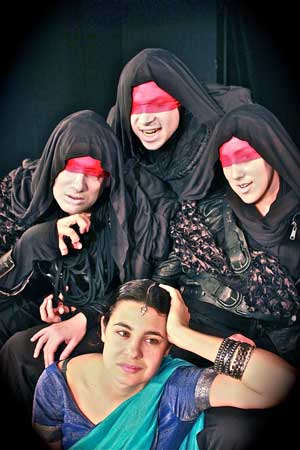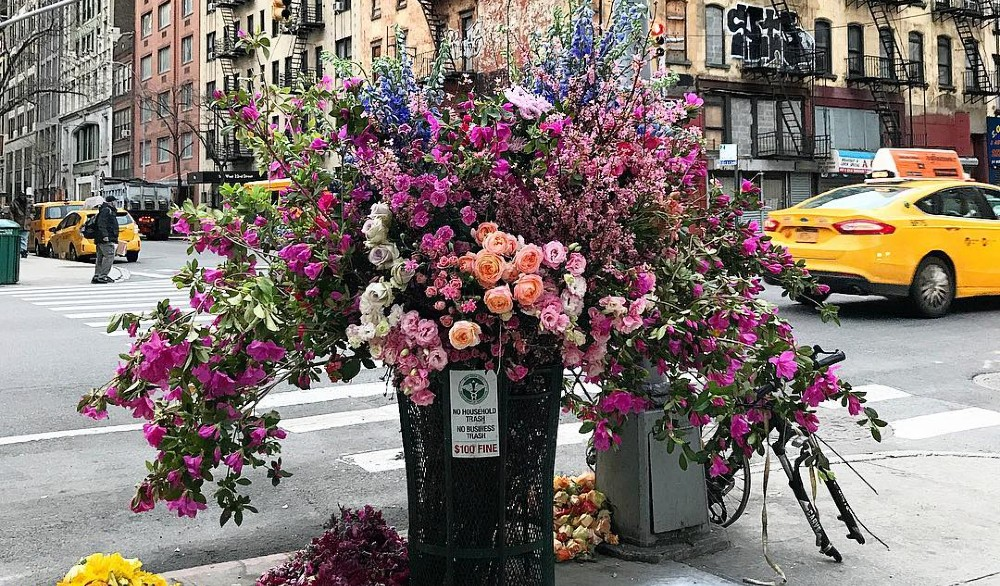 [/media-credit]
[/media-credit]
- Center: Mariam Habib (Yamuna); Vultures (L-R): Antonio Miniño, Eric Percival, Deanna McGovern.
Clouds gather on eve of India & Pakistan Partition
BY JERRY TALLMER | In August 1947, when at long last the British coldly washed their hands of India by partitioning that powder keg into two separate halves (one Hindu, one Muslim), two peoples who had been living together in some simulacrum of peace for hundreds of years suddenly began slaughtering one another in a massive geographic shift of populations.
The death toll — rape and murder toll — is believed to have reached one million.
“Parts and Stitches” playwright Riti Sachdeva’s father was 12 years old.
“He remembers it well,” says that daughter. “My mom was too young.”
Hans Sachdeva (“Hans means Swan and Sach means Truth and Deva means God, in Hindi”) made it with his parents out of what was shortly to become Pakistan, ending up in a city called Bhilai in the state of Chhattisgarh in east-central India — where he would, as a man, work in the office of a famous Indian steel plant. And where Riti Sachdeva would one day herself be born, twenty-two years after Partition.
Pakistan is not very popular with Americans right now, a journalist remarks for no good reason, maybe because Riti Sachdeva is what the journalist’s mother would have called a raving beauty, with a diamond nestling at her nose.
“Everybody takes turns with their popularity,” Ms. Sachdeva says with a wisp of laughter.
The full title of this, her first full-length play, is for precise if somewhat clumsy reasons, “Parts of Parts and Stitches.”
It takes place on the eve of Partition, which happens also to be the eve of a wedding of two attractive young Hindu people, Jiwan and Yamuna — think George and Emily of “Our Town” — in a village much like the real one the playwright’s father and his parents fled in 1947.
Yes, there will be violence aplenty in “Parts and Stitches,” even as the wedding gown is being frantically stitched into perfection. Characters, Muslim as well as Hindu, will die hideous deaths, far offstage but very near for all that.
Early on, the groom and his mother are involved in conversation with a tailor’s apprentice who happens to be, like his employer, a Muslim.
“Leave while you have the chance,” urges the knowledgeable apprentice. “Before we…before the danger arrives here.”
He had started to say: “Before we deal with all you Hindus,” but thinks the better of it.
“We’ve been here for generations,” the groom throws in.
“The past is useless after what’s happened,” says the apprentice.
“It can’t happen here,” declares Veena, the mother of the groom. (“A fabulous actress named Purva Bedi,” injects the playwright.)
IT CAN’T HAPPEN HERE!
Jumps out at you, doesn’t it?
It happens to be the title of a famous 1935 novel by America’s Nobel Prize Winner for Literature, Sinclair Lewis. A book on which some of us grew up. A book about the coming of Fascism — of Nazism — to the United States of America. And also, in real life, what some of my relatives in Germany were saying as late as 1932.
Is the inclusion in “Parts and Stitches” of that line a tribute to Sinclair Lewis?
“I think it was, a bit,” says Riti Sachdeva. Pause. “We think we’re too smart to be manipulated. Then next thing you know…”
And next thing you know in “Parts of Parts and Stitches,” four vultures of fate are wheeling and dealing and smoking cigarettes and devouring the wedding sweetmeats and screaming omens like the witches in “Macbeth” or a Greek chorus without Greeks.
“This play is the story of my family — my Dad,” says Riti Sachdeva.
Did your father lose treasured people, Hindus like himself, in the maelstrom of Partition?
“Yes, he did. But what I want to emphasize, what the play wants to emphasize, is that every side lost some people.”
Parts and stitches of a million people.
“Yes.”
Do you, these days, have any Muslim friends?
“Oh yes. We discuss the stupidity of it, the waste.”
But, says a skeptic — this one — all religions spill a lot of blood in stupidity and waste, don’t you think?
“Oh yes.”
In 1975, the Sachdeva family up and moved from India to Boston, Mass., U.S.A.
“I was 6. What do I remember? I remember that the supermarkets were full of hundreds of boxes of cereal.”
She received her schooling in North Cambridge and Arlington, Mass. — and, “In 1997, I jumped on an Amtrak for Albuquerque, New Mexico, with a friend named Lisa Seepaul, from Trinidad. Why? I don’t know. I guess I just always wanted to see New Mexico. Maybe when I was little I saw some television special on New Mexico.
“Anyway, I went there expecting to spend just a few days, and stayed for fifteen years. Got my B.A. in Fine Arts and Theater, from the University of New Mexico in Albuquerque, and studied at the National Institute of Flamenco, also in Albuquerque.
“I started writing for my solo pieces, including one about the indentured laborers of Trinidad, and my thesis was a flamenco play called ‘La Fea,’ which means The Evil One.”
Albuquerque is where she also started writing “Parts of Parts and Stitches.”
For research, she went to members and friends of her own family.
“I collected stories — oral histories — in audiotalk interviews. Many of the situations in the play, and some of the characters, are based on their stories.”
She is proud of Maieutic Theatre Works for having twice produced this play, first in its own NewBorn Festival and now Off-Broadway on 14th Street. “It’s a fourteen-character piece, a stretch for everyone — and a huge risk for them.”
Good things come in more ways than one. Riti Sachdeva is now in the Emerging Writers group at the Public Theater, and she’s just found a sublet in Crown Heights.
Vultures, stay away from her door.
Parts of Parts & Stitches
Written by Riti Sachdeva
Directed by Cat Parker
A Maieutic Theatre Works presentation
Through March 31
At the Theater at 14th Street (334 E. 14th St., btw. 1st and 2nd Aves.)
For tickets ($18, $12 students/seniors), call 866-811-4111 or visit mtworks.org

















